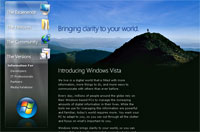 After a morning of fishwife-hot rumours, it’s been officially announced that the next version of Microsoft Windows – previously code-named Longhorn – will be known as Microsoft Vista.
After a morning of fishwife-hot rumours, it’s been officially announced that the next version of Microsoft Windows – previously code-named Longhorn – will be known as Microsoft Vista.
Although wags are already suggesting that the word might apply to the distant view of the product consumers will get for many months/years, Microsoft remains confident of an ontime release in the second half of next year.
Naturally, a big new product needs a suitably uplifting tag line, so the cappuccino-supping, flipchart-flapping, brainstormin’ visioneers at Redwood have come up with:
“MicrosoftVista. Clear, Confident, Connected: Bringing clarity to your world.”
The story was first broken by anonymous sources close to the company (that generally covers anyone from the cleaner to the guy who delivers the water cooler) who revealed that Microsoft had unveiled their new name in Atlanta during the company’s internal sales event, known as the Microsoft Global Sales Briefing (that’s ‘MGB’ to those in the know).
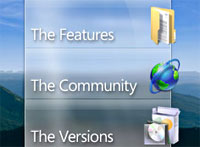 Possibly because of a fear of failing to release the product in the year bearing its name, Microsoft has once again shied away from its earlier practice of releasing dated operating systems (Windows95, Windows98 etc).
Possibly because of a fear of failing to release the product in the year bearing its name, Microsoft has once again shied away from its earlier practice of releasing dated operating systems (Windows95, Windows98 etc).
The current major version of Windows originally regaled under the name of ‘Whistler’ during development before being christened WindowsXP prior to its public release.
Brad Goldberg, a Microsoft product manager, said that the first beta of Vista is slated for release on Aug. 3 and will be targeted at developers and IT professionals.
Goldberg stated that Vista’s three design goals include better security, new ways to organize information, and seamless connectivity to external devices.
A second test release is anticipated to be debuted before Vista’s full release next year.
More details about the new operating system’s features will be announced on August 3.
 The European Parliament has voted overwhelming against a controversial bill that might have led to software being patented.
The European Parliament has voted overwhelming against a controversial bill that might have led to software being patented.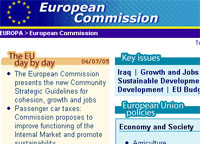 The bill was supposed to get rid of individual EU nations’ patent dispute systems and replace it with a common EU procedure. Instead, the old system of patents being handled by national patent offices will continue, without any judiciary control by the European Court of Justice.
The bill was supposed to get rid of individual EU nations’ patent dispute systems and replace it with a common EU procedure. Instead, the old system of patents being handled by national patent offices will continue, without any judiciary control by the European Court of Justice. China has opened its first officially licensed clinic for Internet addiction as State media reports growing cases of obsessed Internet gamers whose addiction has caused them to quit school, commit suicide or
China has opened its first officially licensed clinic for Internet addiction as State media reports growing cases of obsessed Internet gamers whose addiction has caused them to quit school, commit suicide or 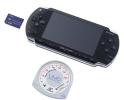 Sony’s PlayStation Portable is a media hub, but unfortunately, apart from games there isn’t really any content available for it (not forgetting unlucky UK citizens who can’t even officially buy one until September).
Sony’s PlayStation Portable is a media hub, but unfortunately, apart from games there isn’t really any content available for it (not forgetting unlucky UK citizens who can’t even officially buy one until September). Using an Apple Mac has many advantages and ripping DVDs is one of them. Look for an application MacTheRipper, it does exactly what is says on the tin, and takes the MPEG2 information from a DVD while removing region coding, macrovision and other DVD annoyances and stores the resulting files on the hard disk.
Using an Apple Mac has many advantages and ripping DVDs is one of them. Look for an application MacTheRipper, it does exactly what is says on the tin, and takes the MPEG2 information from a DVD while removing region coding, macrovision and other DVD annoyances and stores the resulting files on the hard disk. Windows users don’t despair
Windows users don’t despair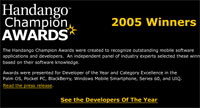 Mobile download site Handango has announced the winners of their Champion Awards at the fifth annual Handango Partner Summit.
Mobile download site Handango has announced the winners of their Champion Awards at the fifth annual Handango Partner Summit.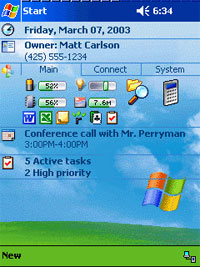 For the Palm platform, the winners included Snapper Mail Deluxe in the ‘work application’ category, with Pocket Tunes Deluxe scooping up the ‘Play’ category.
For the Palm platform, the winners included Snapper Mail Deluxe in the ‘work application’ category, with Pocket Tunes Deluxe scooping up the ‘Play’ category.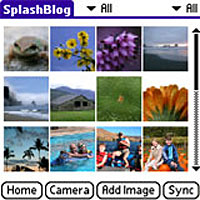 The comprehensive MobiLearn Talking Phrasebook, a talking multi-language phrasebook for the Pocket PC with “pure native voices”, snagged the “Best Industry Application” award.
The comprehensive MobiLearn Talking Phrasebook, a talking multi-language phrasebook for the Pocket PC with “pure native voices”, snagged the “Best Industry Application” award. Smarting daily from the soaring popularity of its upstart rival Firefox, Microsoft is hoping to stem the exodus by bolting on new security features to their next version of Internet Explorer browser.
Smarting daily from the soaring popularity of its upstart rival Firefox, Microsoft is hoping to stem the exodus by bolting on new security features to their next version of Internet Explorer browser.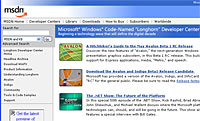 With Internet Explorer losing friends fast because of its unsavoury reputation as a honeypot for homepage hijackers and skulking spyware, these new security features can’t come too soon for Microsoft.
With Internet Explorer losing friends fast because of its unsavoury reputation as a honeypot for homepage hijackers and skulking spyware, these new security features can’t come too soon for Microsoft. These days, a smartphone/PDA isn’t worth sniffing at unless it comes with a built in camera and a shedload of internal/external memory for storing mobile snaps on.
These days, a smartphone/PDA isn’t worth sniffing at unless it comes with a built in camera and a shedload of internal/external memory for storing mobile snaps on. When you install the Pocket PC program, there’s also an option to install the Resco Album Generator on your desktop PC – this program lets you create photo albums ON your desktop and then have the pictures and the album information transferred to your handheld device on the next sync.
When you install the Pocket PC program, there’s also an option to install the Resco Album Generator on your desktop PC – this program lets you create photo albums ON your desktop and then have the pictures and the album information transferred to your handheld device on the next sync.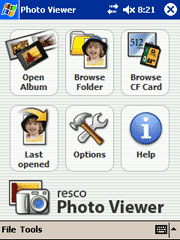 In full screen mode, the keypad can be used to scroll through picture collections manually, or users with tired fingers can set up a slide show and choose from a selection of transition fades and effects.
In full screen mode, the keypad can be used to scroll through picture collections manually, or users with tired fingers can set up a slide show and choose from a selection of transition fades and effects.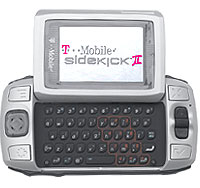 The mobile Internet handset – developed by Danger and manufactured by Sharp Corporation – will be made available on service contract for £68.70 (~€100, ~US$125).
The mobile Internet handset – developed by Danger and manufactured by Sharp Corporation – will be made available on service contract for £68.70 (~€100, ~US$125). The feature-stuffed handset includes a mobile phone, push email, instant messaging, HTML Web browser, text-messaging, calendar, address book, an integrated digital camera and the option to download applications and content.
The feature-stuffed handset includes a mobile phone, push email, instant messaging, HTML Web browser, text-messaging, calendar, address book, an integrated digital camera and the option to download applications and content. Beating at the heart of the T-Mobile Sidekick II is Danger’s “hiptop” software and services infrastructure.
Beating at the heart of the T-Mobile Sidekick II is Danger’s “hiptop” software and services infrastructure.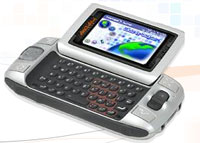 Also known as the Hiptop 2, the 130 x 66 x 22 mm (5.1″ x 2.6″ x 0.9″) handset features a flip Transflective TFT 240×160 pixel screen and an integrated VGA (640 x 480 pixel) camera.
Also known as the Hiptop 2, the 130 x 66 x 22 mm (5.1″ x 2.6″ x 0.9″) handset features a flip Transflective TFT 240×160 pixel screen and an integrated VGA (640 x 480 pixel) camera.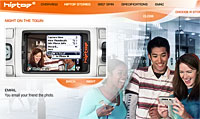 T-Mobile are also releasing a “trendy” version of the Sidekick, resplendent in distinctly un-macho pink sparkly bits.
T-Mobile are also releasing a “trendy” version of the Sidekick, resplendent in distinctly un-macho pink sparkly bits. The insatiable appetite of hungry surfers desperate for more information, analysis and intelligence has fuelled a database market growth of 10.3 percent in 2004, according to research released by the Gartner Group.
The insatiable appetite of hungry surfers desperate for more information, analysis and intelligence has fuelled a database market growth of 10.3 percent in 2004, according to research released by the Gartner Group.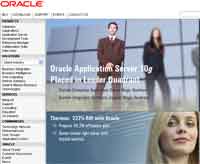 Despite being a still a relatively small part of the overall RDBMS market, the Linux segment is as hot as an extra spicy vindaloo, registering 118 percent growth in 2004, more than doubling from US$300 million in 2003 to over US$650 million in 2004.
Despite being a still a relatively small part of the overall RDBMS market, the Linux segment is as hot as an extra spicy vindaloo, registering 118 percent growth in 2004, more than doubling from US$300 million in 2003 to over US$650 million in 2004.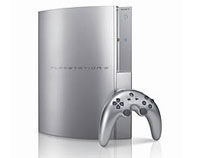 Games:
Games: I don’t currently own an Xbox, but I have been quite a fan of Sony’s Playstation for a while: I had two of the original Playstations, PS1 and PS2 for various reasons. You might’ve thought that I would’ve been looking forward to the
I don’t currently own an Xbox, but I have been quite a fan of Sony’s Playstation for a while: I had two of the original Playstations, PS1 and PS2 for various reasons. You might’ve thought that I would’ve been looking forward to the